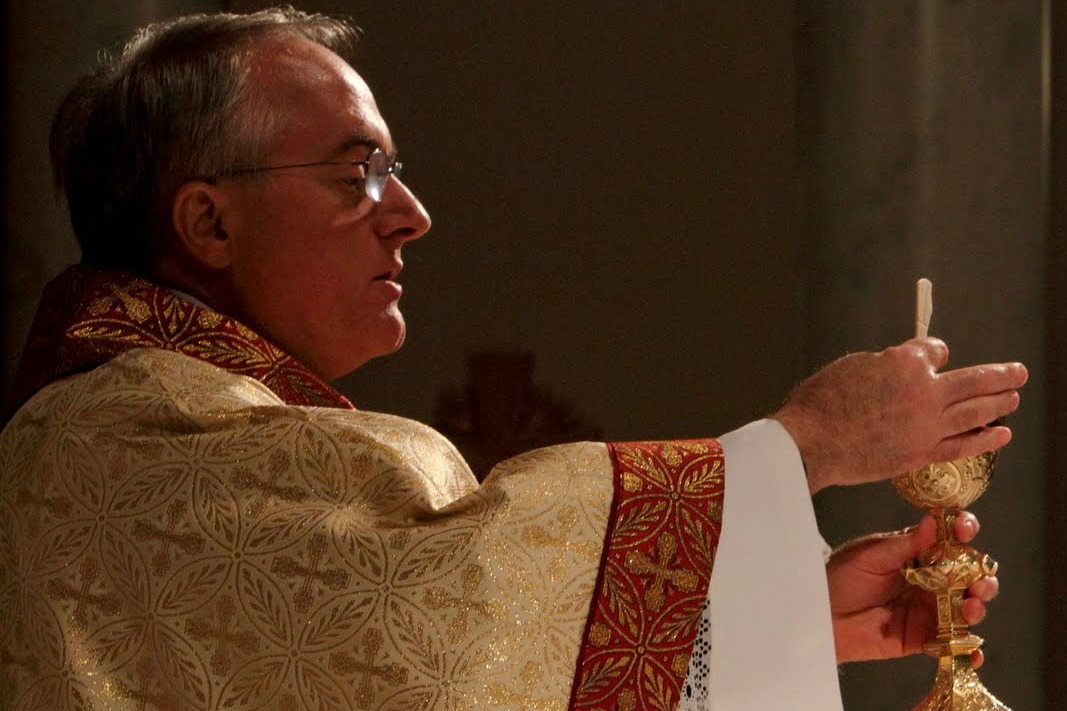Many of us struggle with the “presence in absence” of God in the Eucharist. It is hard to believe that our God, incarnate in Jesus Christ, is really and actively present with us in the Eucharist, which seems to be just mundane, ordinary bread and wine. When faced with this feeling of doubt or even apathy, I find that the “Lamb of God” impels me to confront the “presence-in-absence” of God in the Eucharist in a new way.
First, the congregation says or sings this acclamation addressed to Christ:
Lamb of God, you take away the sins of the world; have mercy on us.
Lamb of God, you take away the sins of the world; have mercy on us.
Lamb of God, you take away the sins of the world; grant us peace.
Then, the priest raises the eucharistic species and says aloud this text combined from John 1:29, 36 and from the Book of Revelation 19:4 acclaiming the supper of the Lamb:
Behold the Lamb of God;
behold him who takes away the sins of the world.
Blessed are those called to the supper of the Lamb.
This acclamation always strikes me because it reveals the cosmic and eschatological meaning of the Eucharist. Before the invitation to Communion—to “come and follow”—is the invitation to “look and see.” The “behold” is of a cosmic order, reverberating throughout time and space, extending to all of creation. It invites all to look and really see who Jesus Christ is and what his Paschal Mystery is all about: Behold, the Lamb of God! Ecce homo—Behold, the man! Behold, the wood of the Cross on which is hung our salvation! This behold causes an initial reaction of consternation. What is this paradox of the God-man, who lays down his life in love for all of us whom he calls “his friends”? It strikes us in awe of the mercy of God. How can we bear to part ourselves from the God who does this for us?
When we recognize the gravity of this love, beholding it in the Eucharist, we realize that we have to give thanks. For when we behold, we see the created order through a prism that is both biblical and paschal. We perceive the world as created and sustained by God who enters into covenant relationship with humanity, and we see through lenses that enable us to make meaning of the events of our lives in light of Christ’s Paschal Mystery. At every Eucharist, the Lamb of God we acclaim is active among us, showing us that even despite the imperfections of earthly life, we can believe in the world’s final perfection because of Christ’s work of redemption in his victory over sin and death.
This hope invites us to come and adore the creator and redeemer God through the sacrifice of praise and thanksgiving that is the Mass. The proper response to behold is to contemplate and worship, to come and follow, beholding the Christ in our own hearts and in the faces of other people whom we are called to serve in love. The behold points to the reality of the Incarnation and the Paschal Mystery that we celebrate and are called to live in our lives as well. Far from being a mirage, this Lamb of God is the vision of mercy itself. We are also called to behold the Lamb in ourselves, even as we are not worthy for him to enter under our roof. As we lift our eyes and hearts to gaze upon the elevated host and cup, we pray, “Lord, help my unbelief. Let me not be unbelieving but believe.” As Kevin Irwin writes in his book Models of the Eucharist, in challenging ourselves to name our experience of absence in the Eucharist, we can pray that “we might come to believe ever so weakly that God is indeed with us as Emmanuel. The gift of eucharistic presence is that God is indeed present to us in ways beyond our imagining, even or especially when we do not experience it” (213). The Eucharist is true food and true drink, and whoever eats of this bread and drinks this cup will not die, but have everlasting life (cf. Jn 6:55, 58). As pilgrims on this earth, we will never experience God completely in this life, but the Eucharist gives us the provisional and promissory reality of what is to come at the culminating supper of the Lamb, the eschatological banquet in the Kingdom of God.
Grace Agolia (’17) is a junior Theology major and Catholic Social Tradition minor at the University of Notre Dame and an undergraduate fellow at the Notre Dame Center for Liturgy.



